- Home
- Claire North
The Gameshouse Page 16
The Gameshouse Read online
Page 16
Where are Abhik’s men?
(Three still scour the hill looking for you, less than four miles away, a tracker and his friends. They are the nearest and most immediate threat, but they have been diverted by the smuggler’s paths, tricked into thinking that perhaps you too have followed these routes. Another fifty men and women are circling this area, some on boats, some by bicycle, some not even aware that they are playing the game, but rather pieces played by pieces, given your description and told to find you out with no idea of why. Make no mistake, Remy, you are still in the hive, and the hornets are buzzing.)
What will Remy do now?
He lies back to think, while the sky fills up with stars.
Chapter 18
We look down from the sky above, and between the swaying leaves of the forest, whispering with the sound of a shingle sea, we do not see Remy.
The tracker finds the place where he slept in the morning, but the fire died long ago and he left at sunrise, climbing bare rocks which leave no trace where a man might tell that his foot has fallen.
For a while they follow, guessing at the fugitive’s most likely course, but to no avail.
Remy Burke slips away, like breath.
Three days without sighting.
How far may a man on foot go in three days?
Three miles an hour, fifteen hours a day at the very maximum, three days—one hundred and thirty-five miles.
Not possible—no chance—that Remy has gone so far!
On the fourth day, Abhik Lee sits down with a map, draws a circle with a hundred-mile radius of the village where last Remy was seen, and ponders. A hundred-mile radius contains within it a vast area of land, but it is easy to eliminate certain points. His men have been on the rivers, in the towns, at the railway stations, and a foreigner attempting to pass these points would have been noticed. No stranger has been seen in any of the major towns nearby, and though his cards are limited, the resources they can deploy are many. Policemen, soldiers and spies roam the countryside looking for Remy Burke, pieces played by a man who is himself being played, all by Abhik Lee.
Oh, Abhik, do you really think the game stops with you? Do you, as you move your pieces across this map, as hypothetical a board as any chess or backgammon set, do you really think that you are the master of all that unfolds?
We forget, sometimes, how young you are.
Rumours proliferate, of course. A stranger seen in Ratchaphon turned out to be a British journalist, a slave to gin and malaria in roughly equal parts, who was taking a few months out from his posting in Singapore to reconsider his life, and muse whether the time had not come to join the communist party. Another man, glimpsed in Nong Klang was a German archaeologist and his wife. Rumour whispered that the German was, in fact, a Jew, and knew as much archaeology as a killer whale does the tea ceremony but, being a man disowned, invented whatever name it seemed most suited him and thus increased the odds of his survival. A Dutchman twelve miles to the south was searching for precious gems, a crew of thirty quiet locals at his back who neither smiled nor frowned as he paced up and down shouting, “Come, come!” and “Go, go!” at everyone and everything who came near him, these perhaps being the only native words he knew. He was convinced he was going to strike diamond and make it rich, but when the Japanese came he was interned as an enemy alien, and when he was freed in 1945, his voice was broken, though his back was still straight.
All these rumours, Abhik pursues, sending out his pieces to explore every one and knowing, as he does, that none of them are Remy.
The very absence of Remy makes it easier to narrow options.
Somewhere in the wild; somewhere in the wilderness. Sooner or later, he’ll have to show his face, and Abhik knows, without a doubt, that within the circle drawn on his map, he’ll find his prey.
Chapter 19
Day four.
Day five.
Day six.
No sighting.
And what of Remy Burke?
Where are you now?
Why, he sits by the side of a river—no, not even a river—a tributary, a worm of water wriggling through the land that has no name save colloquialisms given by the locals—and fishes.
He was not here yesterday; he will not be here tomorrow. He stole the line and tied it to a bit of wood, skewers his catch on sharpened sticks and cooks it over low ashes. He is tired, muddy, picked over his entire body by insect bites and gently seeping cuts, but his feet are no longer swollen and his belly is occasionally full. One morning he woke to find a snake sizing him up, stretched out to its full length beside him as it assessed whether it could swallow him whole. (It could not, and at his stirring it lost interest.) Another, he woke to find two children—a boy and a girl—staring at him fascinated, enthralled by this leaf-and-bone man hiding in their forest. They ran away when he sat up, and he left his hiding place that very hour, knowing that they could not resist but tell their parents, and their parents would tell a friend, and the friend might tell the police and so, in as little as a few hours or as much as a few days, he would be exposed.
(They told their parents; their parents told their friends. A friend’s cousin, whose wife’s brother was something in the local police, told his brother-in-law, who had received word six days since from his boss in Nakhon Sawan of a man on the run, a half-breed Anglo-Frenchman with dark brown hair, and at once he alerted the authorities and they all rushed to the place where Remy had last been seen to find only the guts of a fish eaten for breakfast and a few grains of stolen rice gobbled in a banana leaf to indicate his passing.)
Remy wanders, and isn’t as frightened as he was before. After the initial shock of his predicament, he has some semblance now of equilibrium. He walks, he walks, his feet passing through agony until at last, hardened like the black scaldings on thick rattan wood, they settle into their shape within his battered boots, and still he walks. One day he steals a bicycle, abandoning it twenty miles up the road in dense undergrowth and following the course of the river instead. The next day he finds a stout stick which is straight enough to be used for walking, and sleeps in the porch of a high-walled temple which he thought was abandoned, until a monk emerges in the middle of the night to give him some water and a little rice, laying cup and bowl beside him without a word, and an older, more portly monk emerges at dawn with a broom to chase and berate him away.
He will move, and he will hide, and he will avoid people as much as he can, until circumstance conspires against him. And if he must meet people?
He will assume the worst and keep running.
Chapter 20
On the seventeenth day, the woman surprised him. The path ran between rice paddies, laid out with wooden boards. He walked it alone beneath a grey sky threatening rain in the early-morning glow before colour invades the land, and when he looked round, she was there, a bicycle propped against a tree, a chicken in the basket, its feet tied together with string, still alive, head sticking out, watching all things uneasily.
She stared at him hard as he approached, and he smiled and bowed a little, and kept on walking.
Her stare was on his back as he walked away.
Two hours later, on a different path up a nearby hill, he heard the rattling of pedals, the bouncing of hard wheels on rough mud. The chicken was gone from her basket, but this time the woman slowed, pulled up a few paces ahead, lent her bicycle to one side and said in heavily accented French:
“Are you all right, sir?”
He replied in her language and saw the surprise on her face. “I’m very well, thank you.”
“Do you know where you’re going?”
“North. I’m on a pilgrimage.”
“Are you… a holy man?”
“No. Just walking.”
This little exchange was enough to carry him by, but she dismounted and caught up with him, matching her pace with his to walk alongside. “How can you be on a pilgrimage if you’re not a holy man?”
“I think pilgrimages are meant to m
ake people holy.”
“Or wipe away sin from evil—that is the other meaning, is it not?”
“In some cultures.”
“You look like a man of some cultures.”
Now he looked at her more closely, taking in her man’s clothes, her broad-rimmed hat, her skin roughened by the sun. With a little work she could have passed for a boy, but she made no effort either way and the effect was oddly attractive. He looked away. They walked together a while in silence.
“Have you been on this pilgrimage long?”
“Not so long, no.”
“Why did you go?”
“I had a gambling problem.”
“Ah—that is a terrible thing!”
“I made a bet that I shouldn’t have made. It may cost me dear. I think—at least, my friend says—that I was tricked into making it, that something more than the drink was behind this mistake. But it was still me, still my voice that agreed, still my game.” He spoke quickly, low, surprised to hear his voice. How long had it been since he’d had human company? The days stretched in the wild when you hid from human sight.
“So you are running away from your debts?”
“No. I am walking to win the game.”
“But you said you were on a pilgrimage.”
“Can it not be both?”
“I do not think a pilgrimage is a proper pilgrimage if you are also using it as an excuse to visit your favourite aunt, or buy silk cheaply to re-sell,” she murmured sombrely. “That’s just business dressed up in orange robes.”
“Yet here I am, walking alone, and though my intentions may be one thing, could we not suggest that the road also changes me?”
“Very well: in the best case scenario, you are on a pilgrimage, but you could be on a far more effective one if you were also not walking to win.”
“I can… accept that premise.”
They walked again a while in silence.
“Why are you talking to me?” he asked. “I don’t have money.”
“That’s a pity—I don’t either.”
“Most people avoid me.”
“Of course they do—you are strange.”
“Does that make you strange for talking to a stranger?”
“I am a widow. If I talk to a man, people whisper about me. So I talk to you.”
“Because… I am not a man?”
“You have chosen the loneliest hour and the emptiest road to walk down. And you are foreign—that makes you something other than a man, and in speaking to you I am something other than a widow. I lived with my husband on the shores of the lake. He used to sell fish to a Frenchman there, a priest come to convert us. The priest wasn’t very persuasive, but he liked the climate and the food, and said that if God had given so few people into his hands, then surely this was a sign that he should stay where he was for longer, rather than move on in search of easier pastures. He made this thing a joke. Then my husband had a pain in his ear, and he died.”
“I’m… sorry to hear that.”
“After, I was going to be a nun in the temple.”
“Why didn’t you?”
“Women cannot pray with the men. They cannot be blessed—it is unclean for the abbot’s hands to touch a woman’s head, even a baby’s.”
“What about nuns?”
“Nuns can touch the children, but nuns sweep and run errands and do not engage in the discourse.”
“You… wanted to be a nun to engage in discourse?”
“Of course I did. The generals rule the country; the king is confined to his palace; the communists fight the nationalists who fight the Japanese in China and in India Ghandi walks to the sea to harvest salt. Of course I want to debate and meditate and pray.”
“That seems… good.”
They kept on walking. Finally she said, “Are you heading to Sok Prah?”
“I don’t know. Where’s that?”
“It’s the village on the other side of this hill.”
“Then I suppose I am.”
“That’s where I live.”
“I see.”
“I don’t think you should go there.”
“Why not?”
“The monks there are narrow-minded.”
“That’s a terrible condemnation for a monk.”
“It’s an easy trap to fall into. You pray, you think, you pray, and in time you forget that the world is bigger than your thoughts. It’s noble for men of business to spend time at temple. I think it is also noble for men of the temple to sometimes spend a week down a mine or delivering babies, yes?”
Despite himself, Remy smiled. “You might be on to something there.”
They walked.
“Also,” she said, “two days ago, two men came into the village: soldiers. They had a picture of a white man, a foreigner, which they stuck to the wall of our elder’s home. He’s a stranger, on the run, a reward of five hundred baht for anyone who helps find him. Five hundred baht is a lot of money in these parts.”
They walked.
“Thank you,” he said at last. Then, as an afterthought, “If they said I committed any crimes, did anything violent, they are lying.”
“Are they?”
“I… play a game sometimes. That is all.”
“What kind of game?”
“Hide-and-seek.”
“Like the children play?”
“Exactly like the children play. I am hiding; someone else is seeking. When he catches me, we’ll swap sides and I’ll seek him. The winner is the one who stays hidden the longest.”
“You are playing a very odd game.”
“I was drunk when I said yes.”
“And this game you also call a pilgrimage?”
“A good game does more than make you smile. Is there a road that doesn’t take me through your village?”
“No. But there’s a path that will take you to a temple, and from there you can climb down to the river.”
“This temple… full of cantankerous monks?”
“They might not sell you out for five hundred baht. Although,” she smiled, “it only takes one, doesn’t it?”
They walked.
“I live outside the village,” she said eventually. “They say that widows bring bad luck. I am poor.”
“And the men who came to your village are rich,” he conceded.
“Are you playing for money? This pilgrimage game of yours, these debts you are afraid of—is it money?”
“No. If I win, I gain life. If I lose, I lose my mind.”
“Those seem like very high stakes.”
“As I said: drunk.”
“Does your game let you kill people?” she asked, sudden and bright, not slackening her pace as she walked beside him. “Is that something you do?”
“There’s no rule against it, but I would still have to make that choice.”
“Would you kill me to keep me quiet? I’ve seen you on this road—I could cycle ahead, go to the village, to the town, to the railway station; they have a man there who speaks Morse code—I could be rewarded. For five hundred baht, people will forget that I’m a widow. If you bet your life, are you willing to take my life to keep your secret safe?”
“I don’t think so.”
“Why?”
“Your body would be found; people would search.”
“Not me; they don’t care.”
“Perhaps they wouldn’t search for your murderer because of any fondness for you. Perhaps they’d only look for fear for their own daughters, wives.”
“Ah—that is a good point! So you wouldn’t kill me because it doesn’t gain you anything?”
“I also like to think I have a code.”
“But the code is not within the game?”
“No.”
“Does it help you win?”
“It… Possibly not. Yet I still have it. But as I said, the situation hasn’t arisen.”
“And so you haven’t been tested? Perhaps you’re right,” she mused. “Perhaps
you are also on a pilgrimage.”
“You want something,” he said, stopping, turning to look into her face. “Tell me.”
“I wanted discourse,” she replied. “You are the first person to talk to me for five months.”
With that, all words die on his tongue.
What do we see here, in this moment? This woman, stick-thin beneath her baggy clothes, standing stiff and straight before a stranger. The people of her village avoid her gaze, turn away; she brings bad luck; she is twice cursed—once for being a widow, and a second time for having no children to support her in her state. Husbands die, but wives who do not produce an heir—they walk in the devil’s shadow! Good people, good monks, good friends, they do not wish her ill—they just wish her elsewhere. Life is too hard for complexity; let questions of the “right” of things be asked when there is more rice in the bowl, more fish in their bellies. Let someone else shake society to its roots; let those who have more time for it wonder at the lot of widows.
She speaks, and it is the first time in five months that she has spoken so many words altogether. For a while, in her isolation, she spoke to the stars, to the dawn, to the birds in the trees, to the Buddha and all his aspects, and to herself. But her words became repetitive and banal, and so she fell silent until now.
Remy Burke has not spoken for four days, and thought he might go insane from it.
“I have a little money,” he said. “May I buy some food from you?”
Chapter 21
Her name was Fon. She was born on the day that the monsoon began, and the winds had blown so violently that the roof of the hut was shaken with it, and water poured in across her face, a blessing, her mother always said, not a sign of nature’s rage.
Her hut lay outside the village, up a stairway of mud cut into the side of a small hill, obscured by low-drooping palms and scarred boulders. The hut was a single room raised up by poles a foot or so above the earth, with a roof of leaves. There had once been a door of tough, dry leaves threaded through a frame, but the frame had cracked and the door now rested on the ground, waiting for repair, the room open to the night. She cooked outside in a pit of charcoal and rounded stones. They ate as the sun went down, listening to the change in the pitch of the forest noises. From the top of the low hill, they could look down into the village, a little circle of candles and cooking fires picked out against the darkness. She said that the hut had belonged to her mother, who had died there four years since, and whose spirit—so the people said—still haunted this lonely hill.

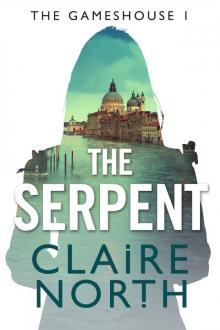 Gamehouse 01 - The Serpent
Gamehouse 01 - The Serpent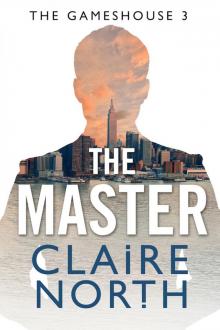 The Master
The Master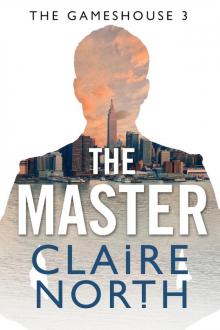 Gamehouse 03 - The Master
Gamehouse 03 - The Master The Thief
The Thief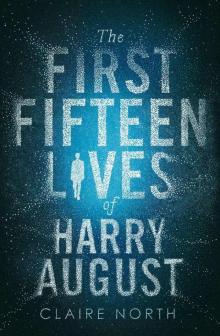 The First Fifteen Lives of Harry August
The First Fifteen Lives of Harry August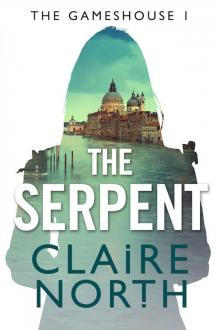 The Serpent
The Serpent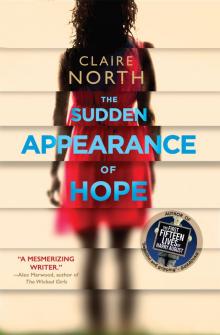 The Sudden Appearance of Hope
The Sudden Appearance of Hope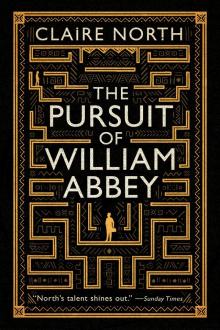 The Pursuit of William Abbey
The Pursuit of William Abbey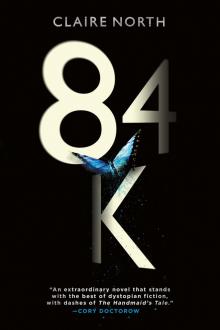 84k
84k The Gameshouse
The Gameshouse Touch
Touch Sweet Harmony
Sweet Harmony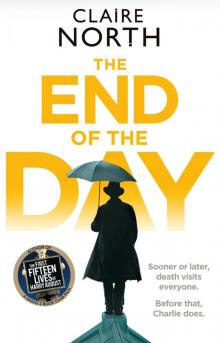 The End of the Day
The End of the Day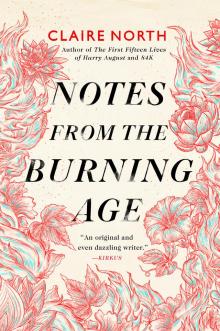 Notes from the Burning Age
Notes from the Burning Age